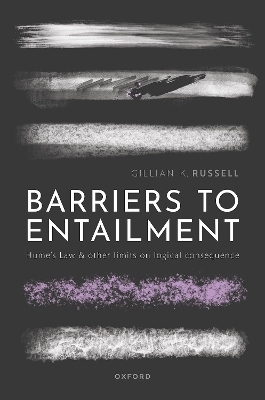
Barriers to Entailment
Hume's Law and other Limits on Logical Consequence
Seiten
2023
Oxford University Press (Verlag)
978-0-19-287473-3 (ISBN)
Oxford University Press (Verlag)
978-0-19-287473-3 (ISBN)
Barriers to Entailment is a book about the limits of logic and their philosophical implications. Gillian Russell shows how, in each of five domains--universality, time, necessity, context-sensitivity, and normativity--- certain kinds of argument are logically unavailable.
A barrier to entailment exists if you can't get conclusions of a certain kind from premises of another. One of the most famous barriers in philosophy is Hume's Law, which says that you can't get normative conclusions from descriptive premises, or in slogan form: you can't get an ought from an is. This barrier is highly controversial, and many famous counterexamples were proposed in the last century. But there are other barriers which function almost as philosophical platitudes: no Universal conclusions from Particular premises, no Future conclusions from premises about the Past, and no claims that attribute Necessity from premises that merely tell us how things happen to be in the Actual world. Barriers to Entailment proposes a unified logical account of five barriers that have played important roles in philosophy, in the process showing how to diagnose proposed counterexamples and arguing that the case for Hume's Law is as strong as that for the platitudinous barriers.
The first two parts of the book employ techniques from formal logic, but present them in an accessible way, suitable for any reader with some background in first-order model theory (of the kind that might be taught in a first class in logic). Gillian Russell introduces tense, modal, indexical, and deontic formal logics, but always avoids unneeded complexity. Each barrier is connected to broader philosophical topics: universality, time, necessity, context-sensitivity, and normativity. Russell brings out under-recognised connections between the domains and lays the groundwork for further work at the intersections.
The last part of the book transposes the formal work to informal barrier theses in the philosophy of language, in the process doing new work on the concept of logical consequence, and providing new responses to proposed informal counterexamples to Hume's Law which employ hard-to-formalise tools from natural language, such as speech acts and thick normative expressions.
A barrier to entailment exists if you can't get conclusions of a certain kind from premises of another. One of the most famous barriers in philosophy is Hume's Law, which says that you can't get normative conclusions from descriptive premises, or in slogan form: you can't get an ought from an is. This barrier is highly controversial, and many famous counterexamples were proposed in the last century. But there are other barriers which function almost as philosophical platitudes: no Universal conclusions from Particular premises, no Future conclusions from premises about the Past, and no claims that attribute Necessity from premises that merely tell us how things happen to be in the Actual world. Barriers to Entailment proposes a unified logical account of five barriers that have played important roles in philosophy, in the process showing how to diagnose proposed counterexamples and arguing that the case for Hume's Law is as strong as that for the platitudinous barriers.
The first two parts of the book employ techniques from formal logic, but present them in an accessible way, suitable for any reader with some background in first-order model theory (of the kind that might be taught in a first class in logic). Gillian Russell introduces tense, modal, indexical, and deontic formal logics, but always avoids unneeded complexity. Each barrier is connected to broader philosophical topics: universality, time, necessity, context-sensitivity, and normativity. Russell brings out under-recognised connections between the domains and lays the groundwork for further work at the intersections.
The last part of the book transposes the formal work to informal barrier theses in the philosophy of language, in the process doing new work on the concept of logical consequence, and providing new responses to proposed informal counterexamples to Hume's Law which employ hard-to-formalise tools from natural language, such as speech acts and thick normative expressions.
Since gaining her PhD in philosophy at Princeton University in 2004, Gillian Russell has been a postdoc at the University of Alberta, Assistant and Associate Professor at Washington University in St Louis, Professor and Alumni Distinguished Professor at the UNC Chapel Hill, and a Professorial Fellow at the University of St Andrews. She has recently moved to Australia, where she works for the Dianoia Research Institute in Analytic Philosophy at Australia Catholic University in Melbourne. Her work focuses on the philosophy of language and logic, and her previous books include Truth in Virtue of Meaning: A Defence of the Analytic/synthetic Distinction.
| Erscheinungsdatum | 30.09.2023 |
|---|---|
| Verlagsort | Oxford |
| Sprache | englisch |
| Maße | 160 x 240 mm |
| Gewicht | 648 g |
| Themenwelt | Geisteswissenschaften ► Philosophie ► Ethik |
| Geisteswissenschaften ► Philosophie ► Logik | |
| ISBN-10 | 0-19-287473-X / 019287473X |
| ISBN-13 | 978-0-19-287473-3 / 9780192874733 |
| Zustand | Neuware |
| Informationen gemäß Produktsicherheitsverordnung (GPSR) | |
| Haben Sie eine Frage zum Produkt? |
Mehr entdecken
aus dem Bereich
aus dem Bereich
Schulbuch Klassen 7/8 (G9)
Buch | Hardcover (2015)
Klett (Verlag)
CHF 29,90
Buch | Softcover (2004)
Cornelsen Verlag
CHF 23,90


